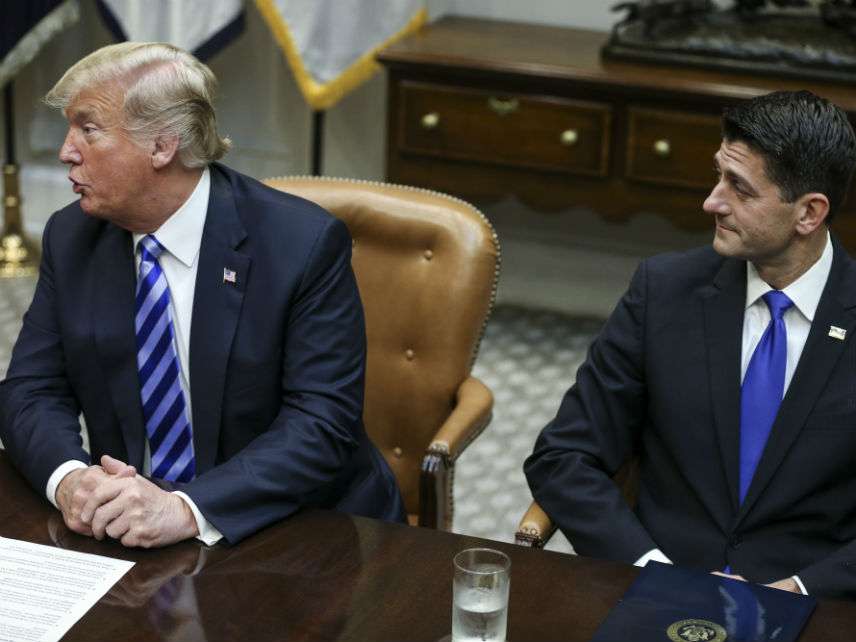Trump, on a Future Debt Crisis: 'Yeah, But I Won't Be Here'
He's probably not wrong.

Those who appreciate the Donald Trump presidency for its transparent refusal to apply lipstick to piggish federal policy have a new example to point to. The Daily Beast is reporting that Trump "has repeatedly shrugged" off any concerns about the massive and rapidly expanding national debt, reportedly saying about the day of debt-reckoning, "yeah, but I won't be here."
This sentiment is no surprise for the dwindling number of people in public life who worry actively about the long-term fiscal unsustainability of the United States. Trump campaigned, successfully, on "protecting" Social Security and Medicare, expanding the already-swollen military budget, and cutting taxes. There was no way in hell that that combination would reduce budget deficits and debt, and hoo boy has it not.
In many ways, the biggest surprise in this story is that there are still "aides and advisers" who "have tried to convince [Trump] of the importance of tackling the national debt." That concern is almost nowhere to be found in major-party politics anymore, Paul Ryan's crocodile tears notwithstanding. The only politician of note I saw bellyaching about debt and deficits in the midterms was Gary "Young People Are Getting Fucked" Johnson in the New Mexico U.S. Senate race, and he only got 15.4 percent of the vote in his home state, only half as much as his unknown GOP opponent. Democrats did not retake the House by promising long-term fiscal sanity.

The four basic options for Republicans who once professed to care about this stuff are: 1) quit (Ryan, Jeff Flake), 2) embrace the loneliness (Justin Amash, Rand Paul) 3) just stop talking about it (a majority of Republicans on Capitol Hill), or 4) opportunistically profess belief in the Growth Fairy, so you can experience the hands-on enjoyment of expanding government power while pretending you don't want to. The latter is the preferred tack of former House deficit hawk-turned White House Budget Director Mick Mulvaney, and also longtime Washington free-market guy and Trump 2016 economic advisor Stephen Moore, who told the Beast, "when [Trump] was confronted with these nightmare scenarios on the debt, I think he rejected them, because if you grow the economy…you don't have a debt problem."
In the world that actually exists, not only is short-term growth (plus tax cuts) not magically wiping away debt, it's adding to the pile, which contributes to the very real risk that accumulated debt loads and service thereof will have a dampening effect on…economic growth. And keep in mind we're on year nine of twin growth spurts in the economy and Wall Street; when those bubbles pop, tax receipts will go down while demand for services will increase.
So yeah, President Trump doesn't give a rip about debt, except for the irritations of having to pay interest (which is why he's jawboning the Federal Reserve). If George W. Bush could double the national debt, Barack Obama could double it again, and Trump could win on a platform that was estimated to double it once more, you can see the thought bubble forming over his head: Fiscal responsibility is for losers.
There was a time in the not-so-distant past when expressing such sentiments out loud was considered irresponsible, even reckless. But that taboo was erased right around the end of 2014, and shows no sign of coming back. Elected politicians on the federal level have learned that voters prefer candidates who never charge current taxpayers anything close to the cost of government. It will probably take an economic disaster, or year-on-year haircut for Social Security recipients, to put a dent in that dangerous dynamic.


Show Comments (226)